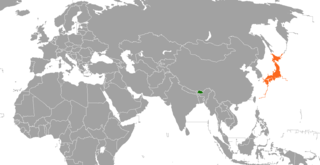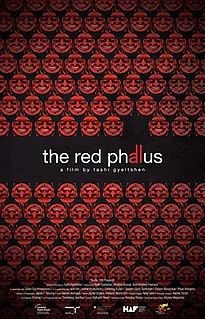Related Research Articles

Karma means action, work, or deed. The term also refers to the spiritual principle of cause and effect, often descriptively called the principle of karma, wherein intent and actions of an individual (cause) influence the future of that individual (effect): good intent and good deeds contribute to good karma and happier rebirths, while bad intent and bad deeds contribute to bad karma and bad rebirths.

Karma yoga, also called Karma marga, is one of the three spiritual paths in Hinduism, one based on the "yoga of action", the others being Jnana yoga and Bhakti yoga. To a karma yogi, right action is a form of prayer. The three paths are not mutually exclusive in Hinduism, but the relative emphasis between Karma yoga, Jnana yoga and Bhakti yoga varies by the individual.

Pema Lingpa or Padma Lingpa was a Bhutanese saint and siddha of the Nyingma school of Tibetan Buddhism. He is considered a terchen or "preeminent tertön" and is considered to be foremost of the "Five Tertön Kings". In the history of the Nyingma school in Bhutan, Pema Lingpa is second only in importance to Padmasambhava.
Karma is a Sanskrit term that literally means "action" or "doing". In the Buddhist tradition, karma refers to action driven by intention (cetanā) which leads to future consequences. Those intentions are considered to be the determining factor in the kind of rebirth in samsara, the cycle of rebirth.

Karma is the basic principle within an overarching psycho-cosmology in Jainism. Human moral actions form the basis of the transmigration of the soul. The soul is constrained to a cycle of rebirth, trapped within the temporal world, until it finally achieves liberation. Liberation is achieved by following a path of purification.

According to Jain karma theory, there are eight main types of karma (Prikriti) which are categorized into the ‘harming’ and the ‘non-harming’; each divided into four types. The harming karmas directly affect the soul powers by impeding its perception, knowledge and energy, and also brings about delusion. These harming karmas are: darśanāvaraṇa, gnanavarniya, antarāya and mohanīya. The non-harming category is responsible for the reborn soul's physical and mental circumstances (nāma), longevity (āyuś), spiritual potential (gotra) and experience of pleasant and unpleasant sensations (vedanīya). In other therms these non-harming karmas are: nāma, āyu, gotra and vedanīya respectively. Different types of karmas thus affect the soul in different ways as per their nature. Each of these types has various sub-types. Tattvārthasūtra generally speaks of 148 sub-types of karmas in all. These are: 5 of jñānavaraṇa, 9 of darśanavaraṇa, 2 of vedanīya, 28 of mohanīya 4 of āyuṣka, 93 of nāma, 2 of gotra, and 5 of antarāya.
The karmic process in Jainism is based on seven truths or fundamental principles (tattva) of Jainism which explain the human predicament. Out of those, four—influx (āsrava), bondage (bandha), stoppage (saṃvara) and release (nirjarā)—pertain to the karmic process. Karma gets bound to the soul on account of two processes:

Desi Jigme Namgyal of Bhutan is a forefather of the Wangchuck Dynasty. He served as 48th Druk Desi of Bhutan (1870–1873), and held the hereditary post of 10th Penlop of Trongsa. He was called the Black Ruler.
Sports in Bhutan comprise both traditional Bhutanese and modern international games. Archery is the national and most popular sport in Bhutan. Competitions are held regularly in most villages. Other traditional Bhutanese sports include khuru, soksom, pundo, and digor.
Yeshey Gyeltshen is a Bhutanese international footballer, currently playing for Druk Star. He made his first appearance for the Bhutan national football team in 2009.

The Bhutan–Japan relations refers to the diplomatic relations between Bhutan and Japan. Diplomatic relations were established on March 28, 1986.
Chencho Gyeltshen is a Bhutanese professional footballer who plays as a forward for I-League team RoundGlass Punjab FC and the Bhutan national football team. He is also Bhutan's all-time leading international goal scorer.
Kuenga Gyeltshen is a Bhutanese international footballer who currently plays for Druk United F.C.. He made his first appearance in their second qualifying round matches and also featured in the 2015 SAFF Championship.

National Assembly elections were held in Bhutan in 2018; the first round was held on 15 September and the second round on 18 October.

Dasho Sherub Gyeltshen is a Bhutanese politician who has been Minister for Home and Cultural Affairs since November 2018. He has been a member of the National Assembly of Bhutan since October 2018.
Choki Gyeltshen is a Bhutanese politician who has been a member of the National Assembly of Bhutan, since October 2018.
Kuenga Loday is a Bhutanese politician who has been a member of the National Assembly of Bhutan, since October 2018.

The Red Phallus is a 2018 Bhutanese Dzongkha-language drama film written and directed by Tashi Gyeltshen.
Karma Lhamo is a Bhutanese educator and politician. She was elected to the National Assembly in 2008, becoming one of its first female members elected under universal suffrage.
References
- ↑ "Know Your NC Candidate (Trashiyangtse)".
- ↑ "Hon. Karma Gyeltshen". www.nationalcouncil.bt.
| | This article about a Bhutanese politician is a stub. You can help Wikipedia by expanding it. |